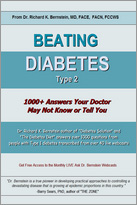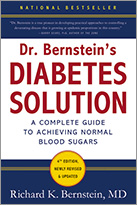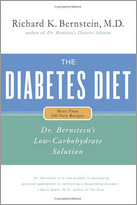Harvey Kent is fifty-one. He has known about his diabetes for approximately six years, and we suspect that he probably had it for three to four years prior to his diagnosis. He has a family history of diabetes, and his story is fairly typical.
“I went in for a routine physical. I’ve always had high risk factors—both my parents had diabetes, my brother had diabetes, and my sister has diabetes. My brother, who was forty-nine, passed away recently from diabetic complications. My sister, who is fifty-nine, is on dialysis. When I found out I had it, I felt I was going down the same slippery slope. I’d been trying to lose weight, but not very successfully. The doctor I was seeing, an endocrinologist, kept upping my medication. Every time I went to see him, I wound up taking more and more, and my blood sugars weren’t going anywhere but up.
“I kept having the feeling that as far as treatment went, nothing was happening. I wasn’t in bad shape, but then I watched my brother pass away, and I thought, ‘I’ve got to do something.’
“I happen to live in Mamaroneck, New York, near Dr. Bernstein, and my wife suggested that I see him for a second opinion. I kept wondering, ‘Is there another approach?’ That’s really how it started. The standard approach was always to tell me to lose weight, to exercise, and to take medication. I was trying to do all those things, but I wasn’t having much success at any of them except the taking of medication. As it turned out, Dr. Bernstein still said the same three things, but his approach to each of the categories was radical, especially on the diet. The diet has been a major factor—I’ve lost a lot of weight.
“Once I started getting a sense of what Dr. B. was talking about—which was really right from the first visit; he’s very thorough in his explanations—I kind of figured it out. Just to demonstrate the effects of diet, he told me to stay on my same diet and measure my blood sugars, but I started cutting back on the carbohydrates, so by the time we sat down to negotiate a meal plan, which was maybe the third or fourth session, he just confirmed what I’d already started about a month before.
“Before I met Dr. Bernstein, I’d been under treatment for diabetes by three different doctors. The guy I was seeing before Dr. B. is an endocrinologist/diabetes doctor with a fairly large practice. He never once said to me, ‘You know, by controlling your blood sugars, most of these complications are reversible.’ When Dr. B. told me that—well, for a diabetic who’s stuck with this disease for the rest of his life, that’s nice to hear. Nobody ever tells you this. At least I don’t remember anyone ever explaining this to me. I’ve been a member of the ADA [American Diabetes Association] for several years, and no one ever said anything like that to me, anywhere. I was lucky. I hadn’t developed that many complications—not like my brother and sister—but I knew how fast they could get you.
“With my old doctor, I’d been told to monitor my blood sugars and then come in every three months. What it was supposed to do, I wasn’t sure—keep you honest, maybe, but I couldn’t figure that out. I was checking my fasting blood sugars in the mornings. They were averaging somewhere about 140 mg/dl. And when I’d go in, the doctor would do blood work, scratch the bottoms of my feet, and check my eyes, then say, ‘See me in three months.’ The whole thing would take maybe half an hour and then I’d see him again in three months. I wasn’t sure what the whole thing was about. The thing is—and I found this out with my sister and my brother—it’s a slippery slope. You start out as a Type II and you get this kind of treatment, and you burn out your pancreas, and before long, you’re insulin-dependent.
“When I saw Dr. B., he did a very extensive medical exam and uncovered everything there was to uncover. He checked everything. He found that I had an anemia, and so we started doing things to deal with that. I had not had retinopathy or neuropathy. I had some protein in my urine, a potential sign of kidney disease. But he said that could be from my old kidney stone, or it could be from the diabetes. He said we’d wait awhile until my blood sugars were normalized, then test again and find out, because if it was the diabetes, it should clear up.
“The first thing he did was get me off Micronase and onto Glucophage. Micronase is one of those oral hypoglycemic agents that stimulate your pancreas, and he said, ‘Why are you doing this? You’re burning your pancreas out quick.’ He looked at my blood sugars carefully and told me I was low at particular times of the day and told me what I had to do to cover the valleys as well as the peaks. Insulin. I never wanted to take insulin. My father did it, and the idea just brought back horrible memories. My other doctor would say, ‘All else is failing, now you have to go on insulin.’ What Bernstein says is, ‘I want you to take insulin in order to cover your peaks and to keep your pancreas from burning out.’ This seems to me a much more sensible approach.
“My wife is very perceptive about the whole thing, and she said what I really needed was a coach, and Bernstein is very much like a coach. Having read up about him and knowing that he was an engineer, you can see the difference in his approach. You can see less of the medical model and more of an engineering model: he’s putting you back together, taking your components and manipulating them in order to accomplish something. He’s a diabetic himself, he knows the thing inside and out, and so you get the sense that he’s much more actively involved. Now I measure my blood sugars 5 times a day, but instead of just jotting them down and saying come back in three months, he adjusts the medication, using it to tweak the peaks and valleys, to get the most optimum response. Now I have excellent control.
“The diet takes some getting used to. Most diabetics, I would surmise, love to eat. Especially if you come from a culture where food is the coin of the realm. People ask me now, ‘What do you eat?’ I say, ‘I have turkey, some salad, and a Diet Coke.’ I used to be a big pancake eater. Talk about your carbohydrate! Every Saturday and Sunday morning for years I would make pancakes for my wife. Now I make them for her and for my daughter and don’t have any—or occasionally steal just a bite—and I miss it, but I am so much more in control now, and I feel so much better. I’ve seen so much of my family go down the slippery slope, it seems a small sacrifice for good health.
“Since the time I started seeing Dr. Bernstein, I’ve lost close to 30 pounds. My blood sugars have dropped by about 35 percent, but my weight loss was not on a weight loss diet, just on Dr. Bernstein’s meal plan. I still have a way to go, but for the first time I feel like I’m in control.”




